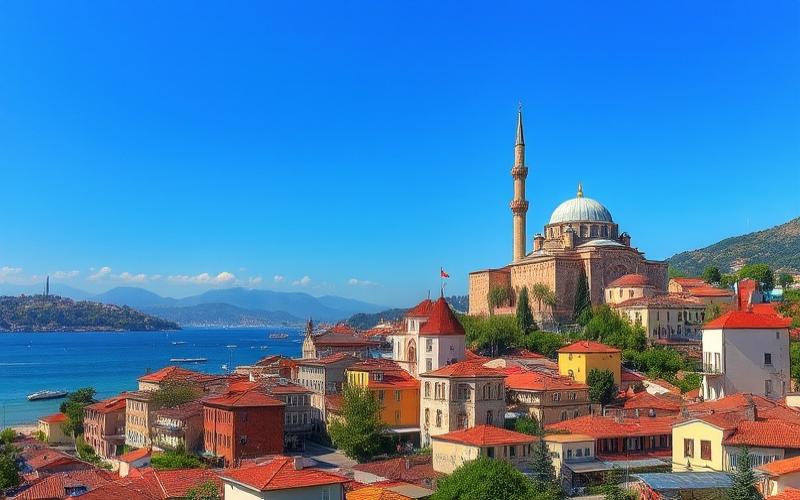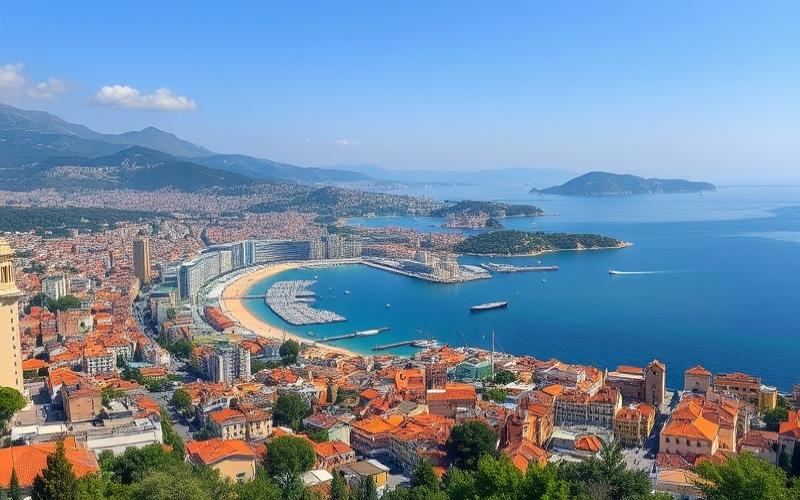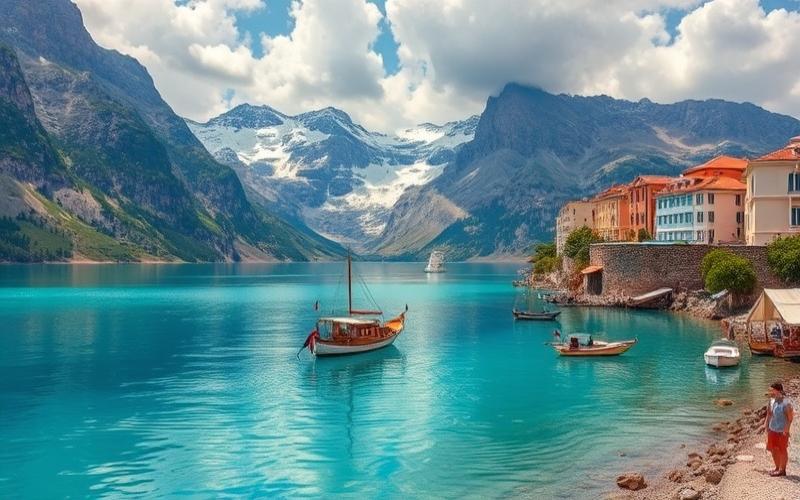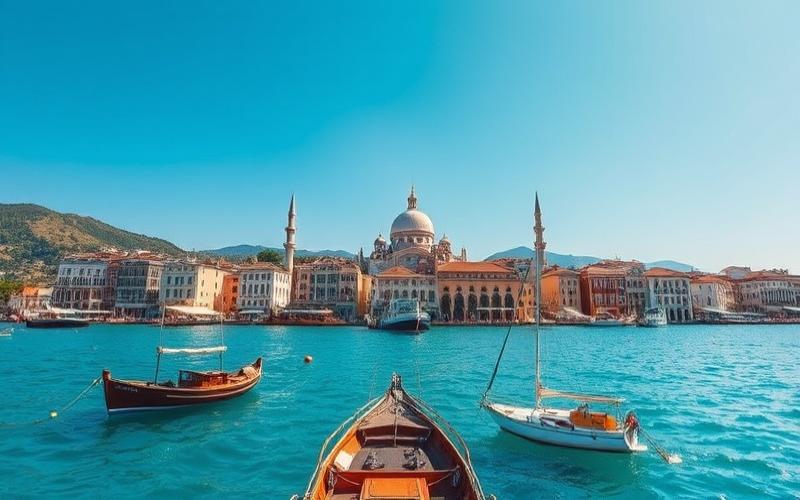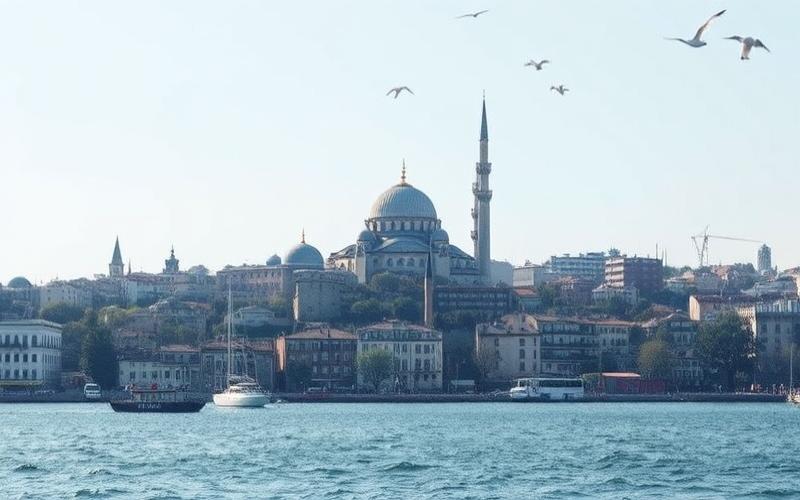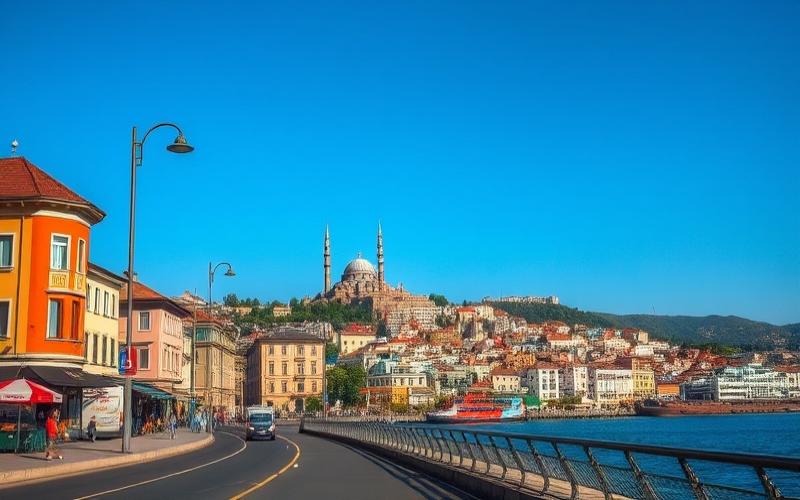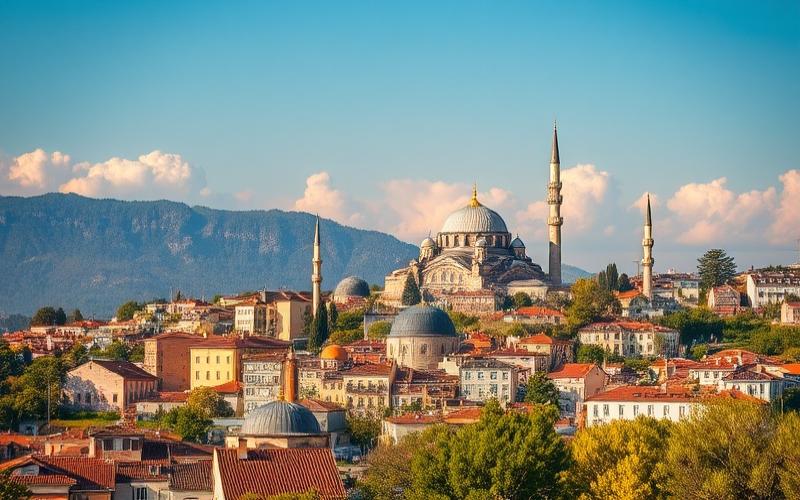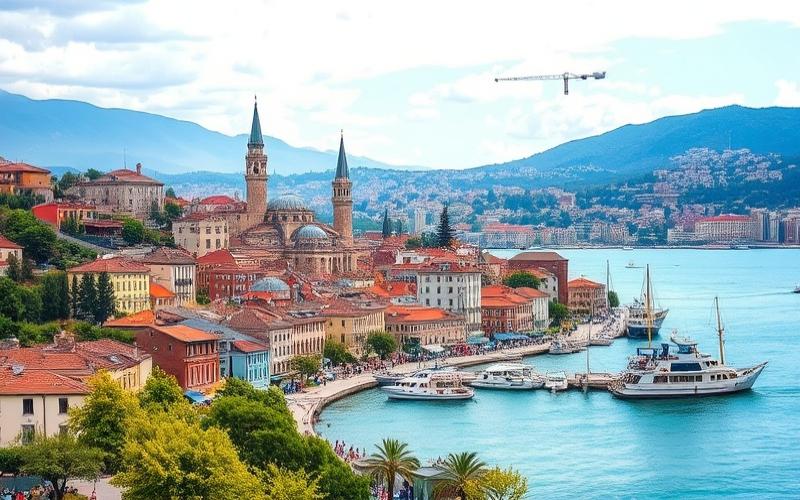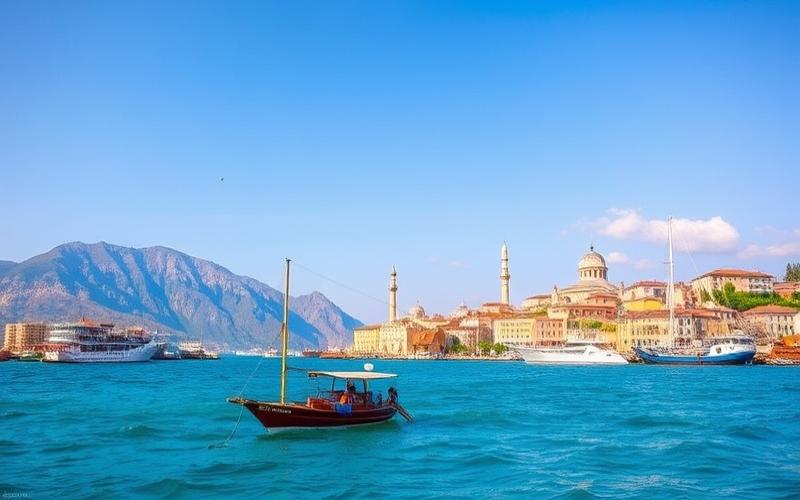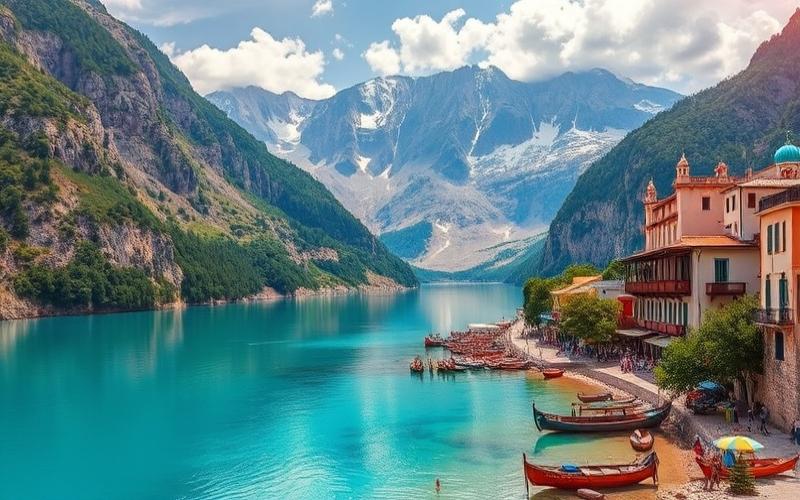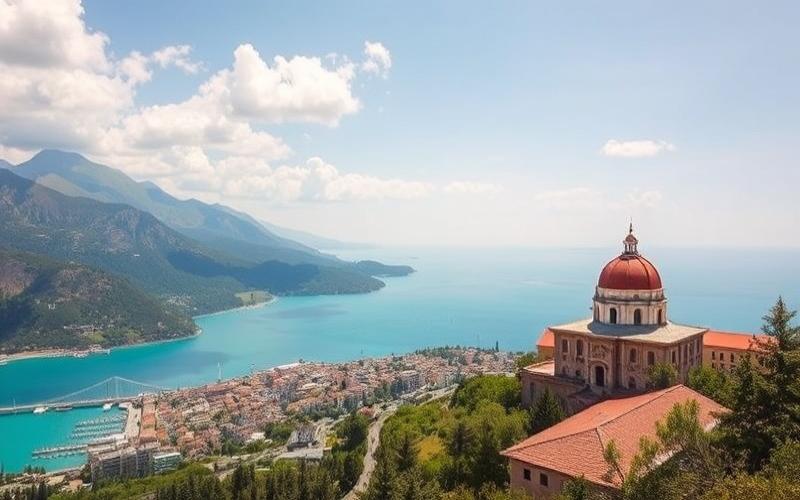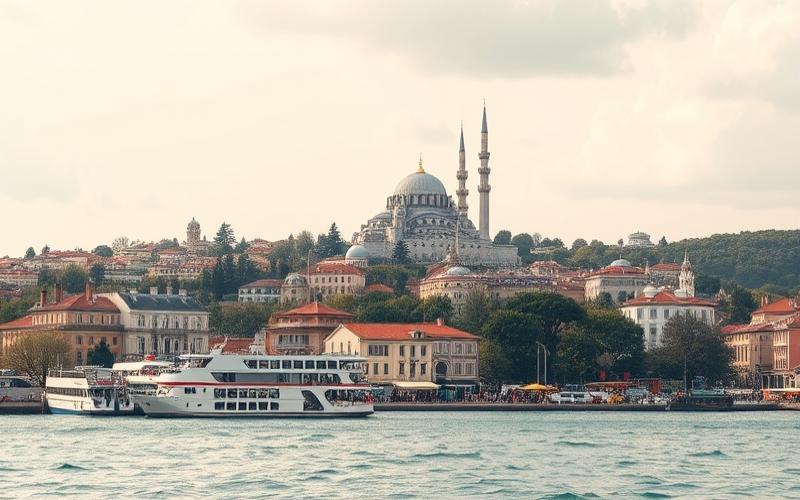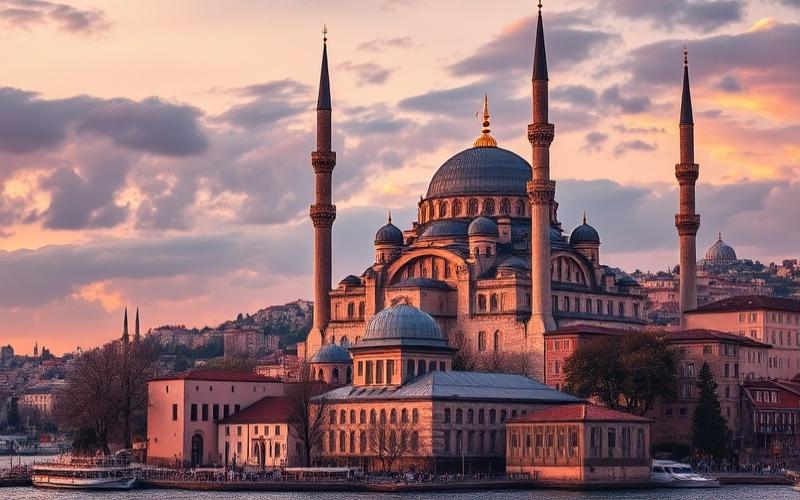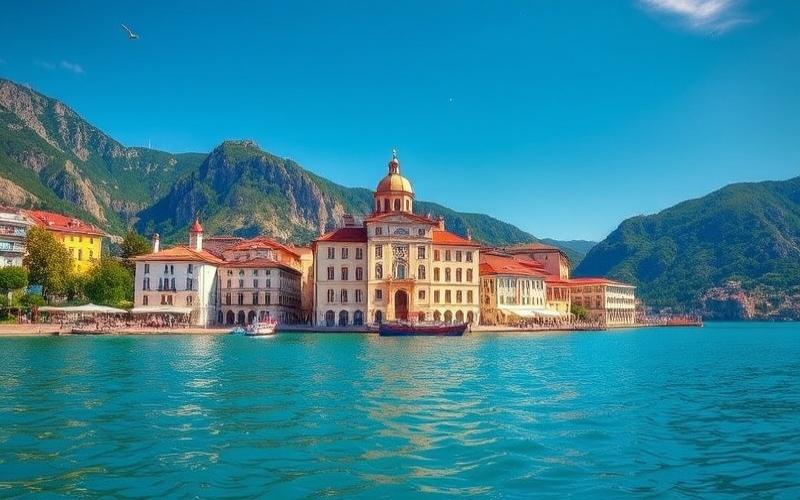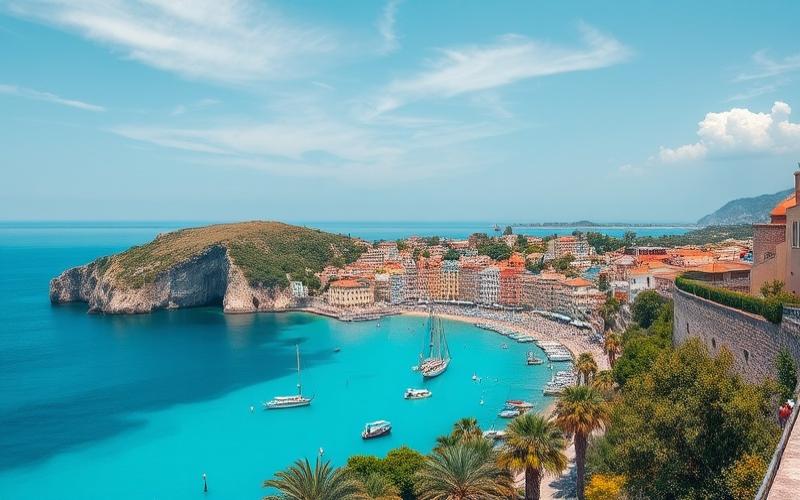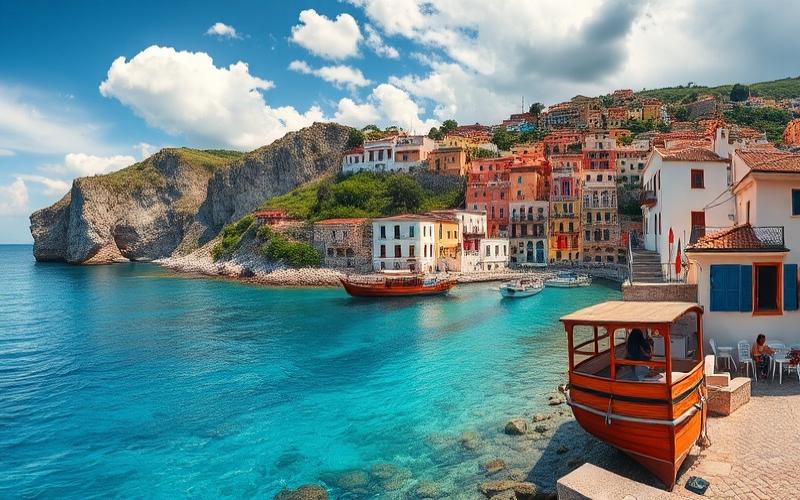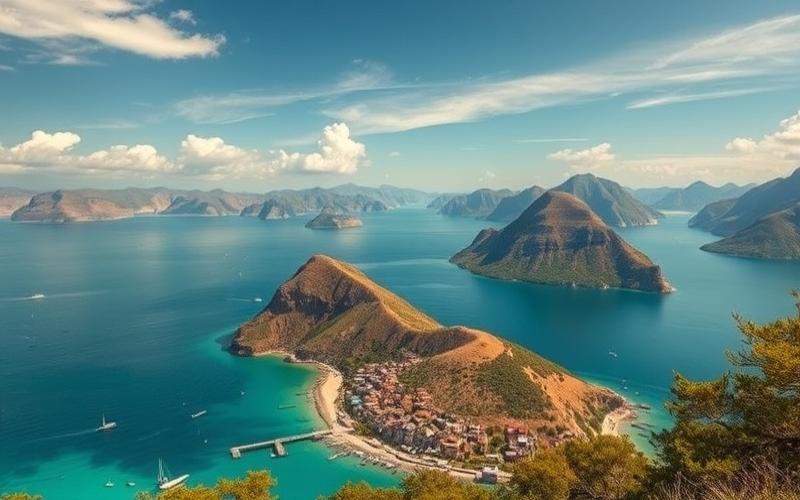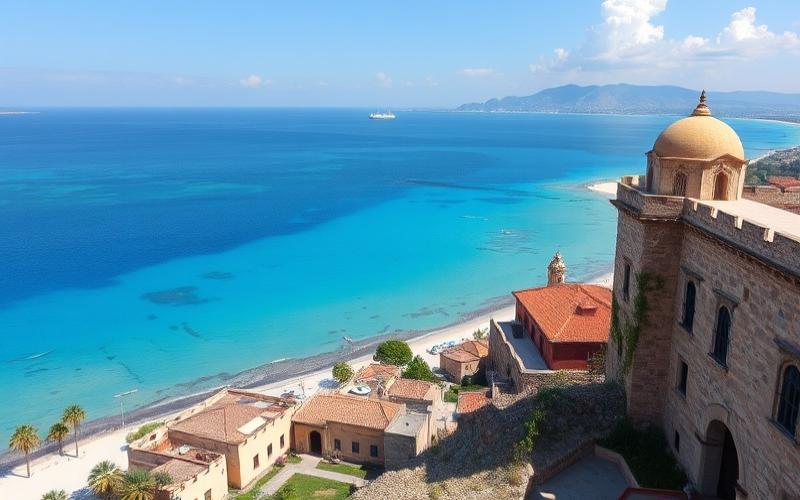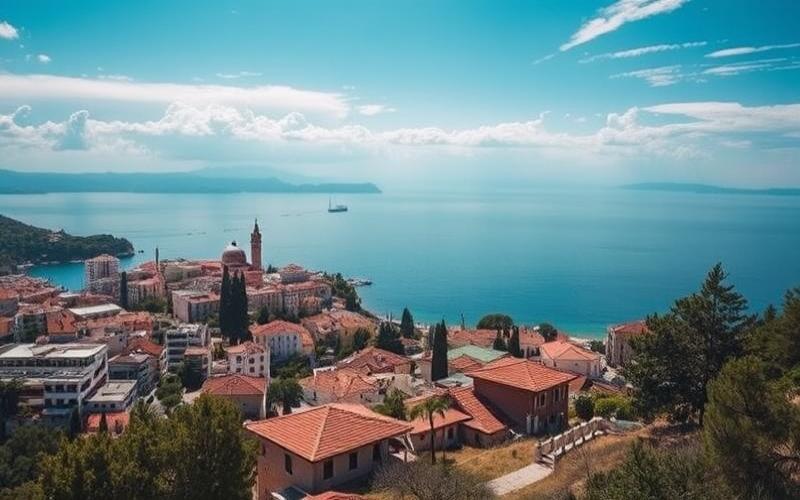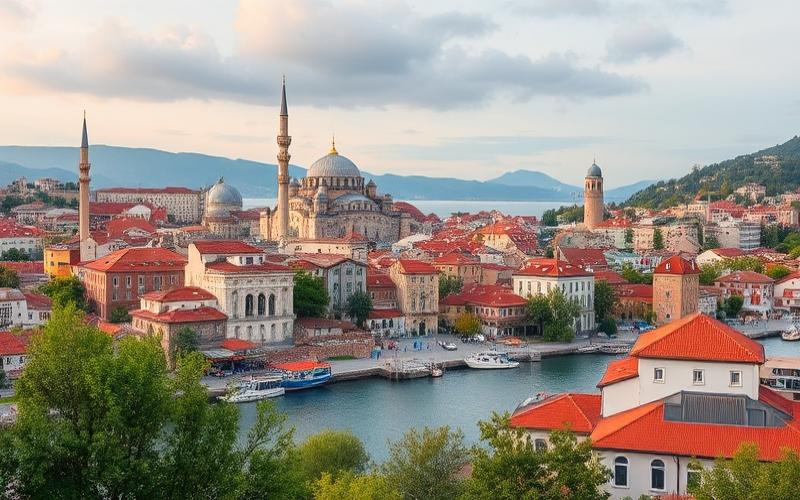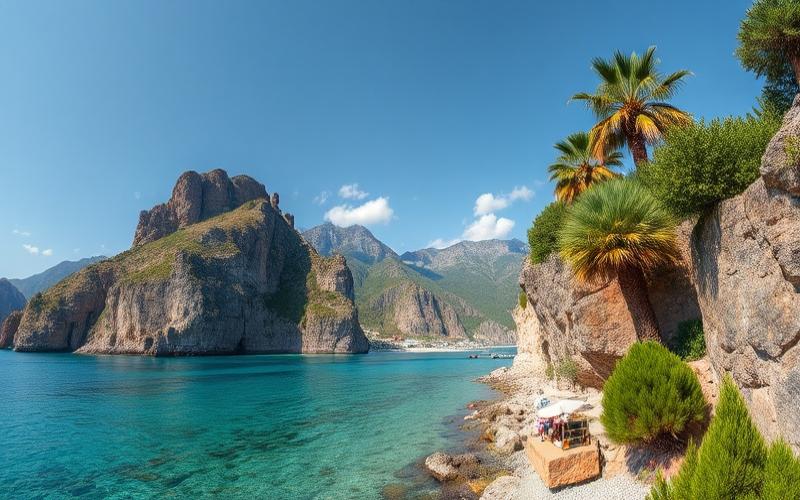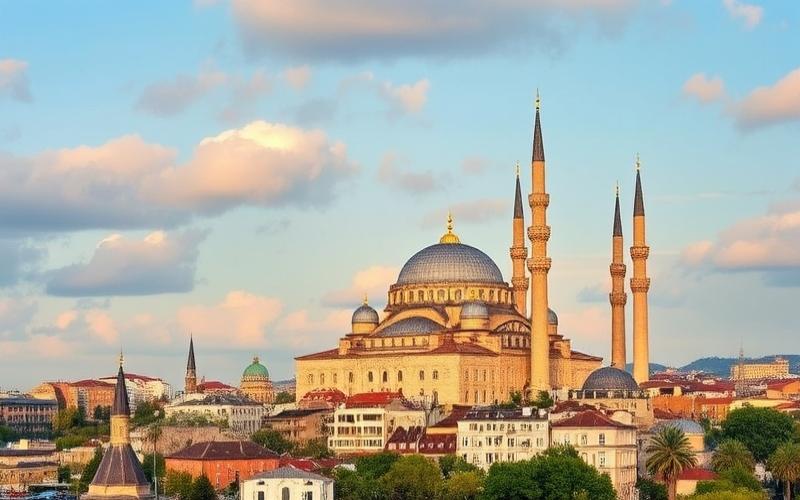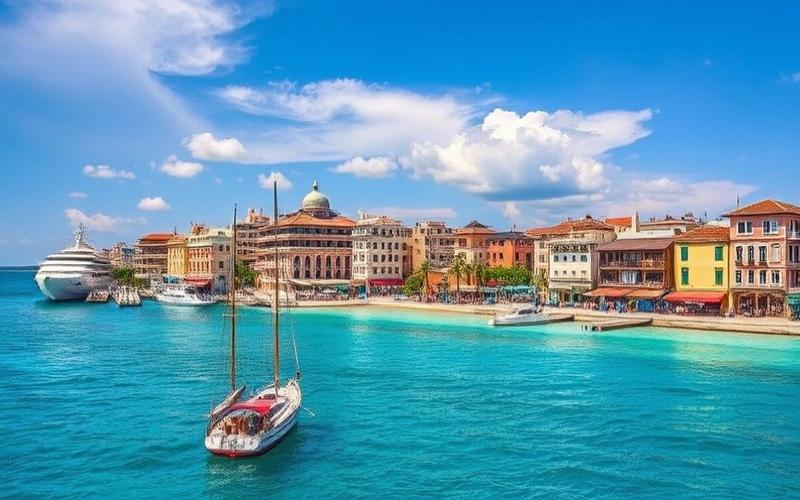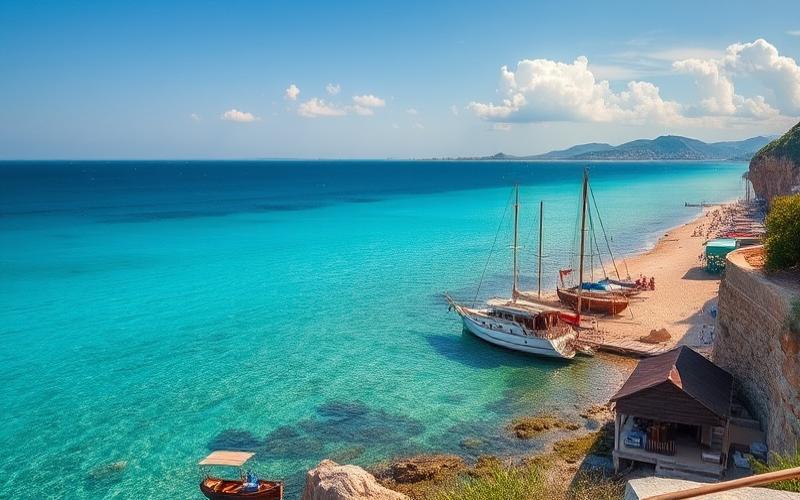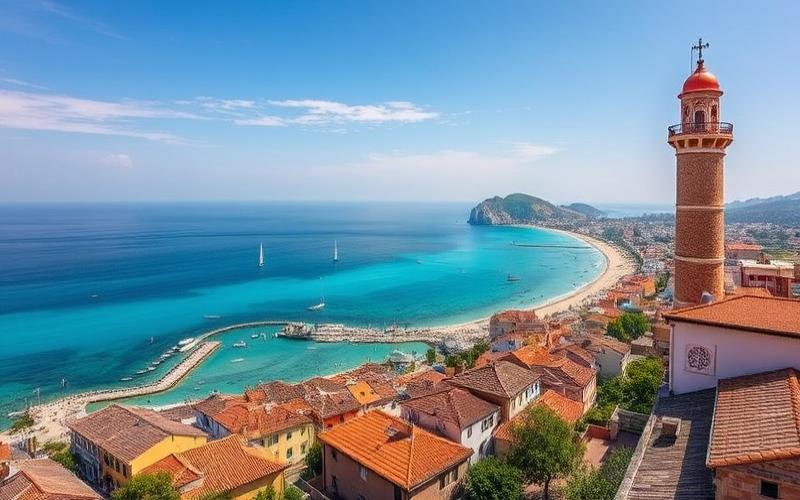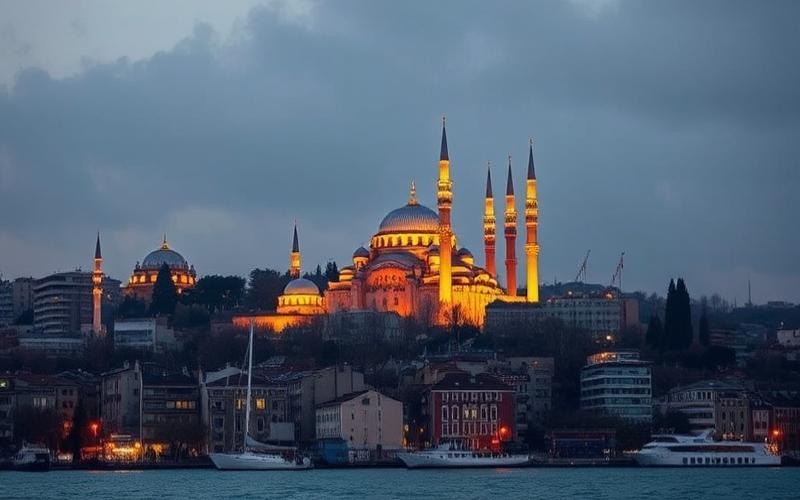
 Published on and written by Cyril Jarnias
Published on and written by Cyril Jarnias
Living in Turkey offers expatriates an adventure rich in discoveries, marked by the diversity of its landscapes and cultural heritage. However, it is essential to intelligently adapt to climate variations to make the most of this experience.
From the scorching summer heat to the damp coolness of winter, each season brings its own set of challenges. In this article, discover practical tips to optimize your daily life, whether it’s choosing appropriate clothing, understanding regional subtleties, or learning how to integrate local practices to enhance your well-being throughout the year.
Adapting to the Turkish Climate: Tips for Expatriates
The Turkish climate is distinguished by great diversity, related to the country’s geography. Three main climate zones are identified:
- Mediterranean climate on the Aegean and Mediterranean coasts: hot, dry summers and mild, rainy winters.
- Humid temperate climate on the Black Sea coast: abundant rainfall year-round, cooler winters with frequent snow in the northeast.
- Continental climate in the interior (Anatolian plateau): very hot, dry summers and cold, sometimes harsh winters with persistent snow; low annual precipitation.
| Region | Climate | Summer | Autumn | Winter |
|---|---|---|---|---|
| Aegean/Mediterranean Coasts | Mediterranean | Hot/dry (often 30°C) | Temperate/rain | Mild/rainy |
| Anatolian Plateau | Variable | Very hot/dry (>30°C) | Cool/dry | Cold/snow |
“Arriving in Ankara at the end of November, I quickly understood that a regular coat wasn’t enough. The sub-zero temperatures were much more biting than what I had experienced elsewhere.”
“During my first summer in Izmir, I had to learn to schedule my outings early in the morning or after 6 p.m… Impossible otherwise with the heat!”
“I discovered that in Trabzon it rains almost every day – a sturdy umbrella is my best friend.”
Additional Useful Resources for Expatriates in Turkey
- Specialized forums such as Expat.com Turkey
- Facebook groups (“Expats in Istanbul”, “Francophones Turquie”)
- Platforms like Internations.org Turkey section
- Mobile apps like Meetup for local networking
These spaces not only provide practical advice but also allow for the exchange of personal tips adapted to Turkish regional realities.
Good to Know:
The climate in Turkey is varied: Mediterranean on the coasts with hot, dry summers and mild winters, continental inland with hot summers and cold winters, and semi-arid in the east. Expatriates must prepare for seasonal variations, such as summer temperatures exceeding 30°C on the Aegean coast, requiring light clothing and rigorous sun protection, and the harsh winters of central Anatolia where temperatures can drop below zero, necessitating warm coats and precautions against snow. To fully enjoy the climates, explore Mediterranean beaches in summer and go skiing in winter at Uludağ. For health, stay well-hydrated and protect yourself from the elements. Expatriates mention that the most surprising aspect is the intensity of the sun, even in spring, or the pleasure of walks through historical treasures during mild autumn days. To exchange tips and advice, join expatriate groups on social media, where sharing experiences enriches adaptation.
Health and Well-being in Turkey’s Climate
Turkey presents great climatic diversity that directly affects the health and well-being of expatriates.
Main Climate Zones
| Region | Main Climate | Characteristics |
|---|---|---|
| Mediterranean Coast | Mediterranean | Very hot, dry summers, mild winters |
| Interior (Anatolia) | Continental | Cold winters, very hot, dry summers |
| Black Sea Coast | Oceanic/humid maritime | Abundant precipitation, moderate temperatures |
| Mountainous East | Mountain | Harsh winters, short, cool summers |
Effects of Climate on Expatriate Health
- Intense summer heat (especially in the South and center):
- Rapid dehydration
- Risk of heatstroke, sunstroke
- Increased fatigue, sleep disorders
- Climate variations: difficult adaptation for sensitive individuals (children, seniors, chronic patients)
- Urban pollution (Istanbul, Ankara, Izmir):
- Worsening of respiratory illnesses (asthma, allergies)
- Effects on the cardiovascular system
Main Summer Health Concerns
- Insufficient hydration
- Excessive sun exposure (sunburn, skin aging, skin cancers)
- Heat-related illnesses (heatstroke, exhaustion)
Adaptation Tips
Diet
- Prefer water-rich fruits and vegetables (watermelon, cucumber, melon)
- Eat smaller meals, avoid heavy and spicy dishes during peak heat
Hydration
- Drink water regularly, even without feeling thirsty
- Limit sugary and alcoholic drinks
Clothing
- Wear loose, light-colored clothing in cotton or linen
- Wide-brimmed hat, UV-protection sunglasses
Managing Sun Exposure
- Apply SPF 30+ sunscreen every 2 hours
- Avoid going out during the hottest hours (11 a.m.–4 p.m.)
- Seek shade whenever possible
Air Pollution
Possible Consequences
- Eye, throat irritation, coughing
- Exacerbation of chronic conditions
Tips
- Avoid outdoor physical activities during pollution peaks
- Use air purifiers at home
- Ventilate your home early in the morning or late in the evening
Local Health Resources
- Mixed healthcare system: public hospitals (more crowded, sometimes less modern in rural areas), private hospitals and clinics (more expensive, more accessible to expatriates)
- Private health insurance highly recommended for quick access and quality care
- Pharmacies very present, professional advice available, wide range of care and prevention products
- English-speaking doctors mainly in large cities and tourist areas
Mental Well-being and Cultural Adaptation
Risks
- Isolation, adaptation stress, culture shock, family distance
Tips
- Practice regular physical activity (walking, swimming, yoga)
- Integrate into the local or expatriate community: clubs, associations, language classes
- Enjoy green spaces, beaches, parks to relax
- Seek professionals (psychologists, support groups) if needed
Tip: Anticipate climate variations and prioritize an adapted lifestyle to preserve your physical and mental health year-round in Turkey.
Good to Know:
Turkey’s varied climate, ranging from Mediterranean on the coasts to more continental inland, can have notable effects on expatriates’ health. During hot summers, particularly in southern regions, it is crucial to stay hydrated and protect yourself from the sun with sunscreen and appropriate clothing to avoid heatstroke. A diet including light, water-rich foods like fresh fruits and vegetables can help maintain good hydration balance. In large cities like Istanbul, air pollution can cause respiratory problems, so it is recommended to avoid high-traffic areas during rush hour and use air purifiers at home. Access to care is facilitated by quality medical services and a wide choice of available care products. Moreover, it is essential to engage in physical and social activities to maintain mental well-being, combining yoga, walks in parks, or expatriate clubs to better adapt to climatic and cultural differences.
Equipment and Home Setup in Turkey
Turkey presents great climatic diversity, ranging from harsh winters in Eastern Anatolia (down to -30°C) to very hot summers on the southern coast (over 40°C). This temperature range requires carefully adapted home equipment depending on the region.
Essential Elements for Adapting to Climate Variations:
- Heating systems:
- Essential in the center and east of the country, where winter temperatures frequently drop below zero.
- Prefer central heating, wood or pellet stoves in cold regions.
- Underfloor heating can improve comfort in new homes.
- Air conditioning:
- Necessary on the southern coast and in central Anatolia where summer temperatures reach or exceed 40°C.
- Reversible air conditioners (heating/cooling) are recommended for their versatility.
- Thermal insulation:
- Use high-performance materials for wall, roof, and floor insulation to limit heat loss in winter and overheating in summer.
- Install double or triple-glazed windows to reduce thermal exchange.
- Sun protection and heat regulation:
- Install thick curtains, blinds, or shutters to limit heat entry in summer.
- Prefer light-colored fabrics that reflect light.
- Use solar films on exposed windows.
- Floor coverings:
- Use rugs or carpets in winter to retain indoor heat, especially on tiled or stone floors which can be cold.
- Indoor plants:
- Plants contribute to air humidification, temperature regulation, and indoor air purification.
- Broad-leaved plants can provide a cooling effect in summer when placed near windows.
Summary Table of Equipment by Climate Region:
| Region | Winter | Summer | Specific Equipment |
|---|---|---|---|
| Southern Coast | Mild (5-15°C) | Very hot (>40°C) | Air conditioning, blinds |
| Central Anatolia | Cold, sometimes snow | Very hot (up to 40°C) | Powerful heating, A/C, reinforced insulation |
| Istanbul/North | Humid/cold winter | Hot/humid summer | Heating, shutters, curtains |
| Eastern Anatolia | Very cold (-30°C) | Temperate summer | Central heating, maximum insulation |
Practical Setup and Equipment Tips:
- Prefer purchasing blackout curtains, thermal blinds, or roller shutters to limit summer heat and retain warmth in winter.
- Install thick rugs in living areas to reduce the feeling of cold.
- Plan controlled ventilation to avoid condensation and humidity in winter.
- Use traditional Turkish materials like kilim (woven rugs) to combine insulation and decoration.
Useful Traditional Turkish Practices:
- Use of kilim rugs or carpets on floors, providing warmth and comfort.
- Construction of houses with thick walls and small openings to limit thermal losses.
- Installation of pergolas or shade sails on terraces for sun protection in summer.
- Creation of inner courtyards and shaded gardens, promoting coolness during the hot season.
Adapting your home in Turkey means combining modern technologies (heating, air conditioning, insulation) with local traditions (rugs, shutters, pergolas) for optimal comfort year-round.
Good to Know:
To adapt well to Turkey’s varied climate, it is essential to equip your home with heating systems for harsh winters and air conditioning for scorching summers, particularly in continental regions. Investing in effective thermal insulation for walls and windows helps retain heat in winter and maintain coolness in summer. Installing thick curtains or blinds can help reduce sun exposure during hot months, while adding rugs or carpets helps retain warmth on colder days. Indoor plants are not just decorative; they also play a role in humidity regulation and air quality. Expatriates can draw inspiration from traditional Turkish practices, such as using Kilim rugs on floors and daily room ventilation, to optimize their home’s thermal comfort throughout the year.
Preventing Climate-Related Illnesses for Expatriates
Understanding local climate conditions in Turkey is essential to anticipate seasonal illnesses like colds, flu, or allergies. The country presents great climatic diversity: Mediterranean climate on the southern coast, continental inland, and more humid in the north. These variations influence the frequency and nature of seasonal ailments, especially during seasonal changes or heatwaves.
Recommended Preventive Measures:
- Stay informed about the vaccination schedule and follow recommended vaccinations (notably against flu).
- Adapt your wardrobe: light, breathable clothing for hot and humid regions, warmer clothes for the interior where temperature swings can be significant.
- Maintain adequate hydration, especially during hot summers or heatwaves.
- Limit exposure to allergens during pollen peaks, particularly in spring.
Table: Wardrobe Adaptation by Region
| Region | Summer | Winter |
|---|---|---|
| Mediterranean Coast | Light clothing, hat | Light jacket, raincoat |
| Anatolian Interior | Light clothing, sun protection | Warm coat, scarf |
| Black Sea Coast | Breathable clothing, raincoat | Mid-season jacket, sweater |
Medical Recommendations Specific to Expatriates:
- Subscribe to health insurance covering climate-related illnesses and hospitalizations, a mandatory condition for obtaining a visa and residence in Turkey.
- Verify that the insurance includes: consultations, hospitalizations, emergency care, and international coverage.
- Contact local doctors to adapt preventive measures to your health status, obtain personalized advice, and inquire about specific treatments for allergies or chronic conditions.
Practical Tips to Strengthen the Immune System:
- Prefer a balanced and local diet: fresh fruits and vegetables, nuts, Mediterranean products rich in antioxidants.
- Practice regular physical activity: walking, swimming, cycling, taking advantage of the favorable climate in many regions.
- Avoid stress, promote restorative sleep.
Key Takeaways:
- Stay informed about climate conditions (extreme heat, pollution alerts, pollen peaks) via reliable sources: official weather bulletins, government websites, specialized mobile apps, and local health alerts.
- Regularly consult health authority recommendations and adapt your habits according to alerts or seasonal epidemics.
Understanding and anticipating the local climate helps limit exposure to seasonal illnesses and adopt an adapted lifestyle, ensuring a more serene and secure stay in Turkey.
Good to Know:
Understanding local climate conditions in Turkey is essential to anticipate and prevent seasonal illnesses such as colds, flu, and allergies, particularly in regions where temperatures vary greatly. It is advisable to follow recommended vaccinations, stay hydrated regularly, and adapt your wardrobe to remain comfortable facing temperature variations. Expatriates must ensure they have health insurance covering climate-related illnesses and consult local doctors for tailored advice. Strengthening the immune system through a balanced diet and regular physical activity is also wise. Finally, stay informed about climate conditions and health alerts by following reliable sources, which will allow better management of potential exposures to seasonal risks.
Disclaimer: The information provided on this website is for informational purposes only and does not constitute financial, legal, or professional advice. We encourage you to consult qualified experts before making any investment, real estate, or expatriation decisions. Although we strive to maintain up-to-date and accurate information, we do not guarantee the completeness, accuracy, or timeliness of the proposed content. As investment and expatriation involve risks, we disclaim any liability for potential losses or damages arising from the use of this site. Your use of this site confirms your acceptance of these terms and your understanding of the associated risks.


